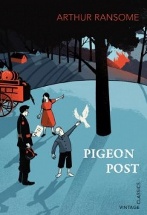Pigeon Post by Arthur Ransome

Vintage, Random House, 2013. ISBN 9780099582540. pbk., 514pp.
Pigeon Post which won the inaugural Carnegie Medal in 1937
from CILIP, the UK library association, is part of the Swallows
and Amazons series written in the early 1930s by Arthur
Ransome. Set in England's Lake District it continues the adventures
of John, Susan, Titty and Roger Walker (Swallows) and their mother
and baby sister, as well as Nancy and Peggy Blackett (Amazons) and
their uncle Jim, commonly referred to as Captain Flint. 'Swallows'
and 'Amazons' refer to the names of the dinghies the children sail
around the lake waters, with the Swallows being 'explorers' and the
Amazons 'pirates'.
The children are once again on school holidays and this time when
they learn of a lost gold seam in the hills above the lake, they
decide to look for it because of the lack of success Uncle Jim has
had in his prospecting trip in South America. Although their home
base is the Blackett's farm at Beckfoot, they move from camp site to
camp site using a pigeon to send a message back to Beckfoot each
day. During their search it appears they have a rival and when
strange things happen after they do discover 'gold', there is an
interesting conflict. However, the drought has meant the countryside
is tinder dry and a fierce fire changes the direction of the story
and interesting things are revealed.
Despite being written about 80 years ago, the Swallows and Amazons
series is one that has endured and is considered a classic in the
adventure genre. Even though at first it might seem a little
old-fashioned within a few pages the reader is absorbed into the
story and enjoying a good read while also learning about life for
children in another time, a time when pigeons were used because
there were no mobile phones.
This re-publication is part of a series of classics being released
by Random House for just $9.95, and which deserve a place on the
library's shelves because they have proven to be stories which
appeal and endure. While they may not appeal to all, I believe that
students should be able to have access to them just because they
come under that heading of classic children's literature. I could
imagine a lot of interest being generated with a display of 'Books
your great-grandparents told you about' (because I'm a grandma and
they were before my time) and even doing a comparison between the
lives of the children in the times of the stories and life now.
Asking whether a pigeon might be more reliable than a mobile phone
could be the basis of a great debate, and may even lead into an
investigation of how pigeons have been used over time, particularly
in war time, sparking a new avenue of reading for some.
Barbara Braxton